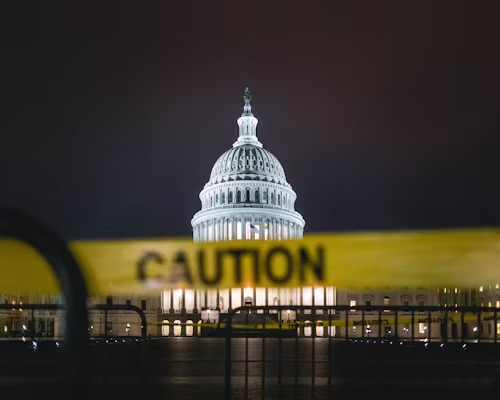Visa Stock Analysis: Is Visa a Strong Opportunity Ahead of Q4 Earnings?
$325.48
28 Jan 2026, 19:25

U.S. Government Shutdown Nearing an End as Congress Moves Toward Funding Deal

Intro
Negotiators in Washington signal progress toward ending the U.S. government shutdown ahead of Thanksgiving. Markets respond with cautious optimism as investors eye a potential funding deal.
Signs of Progress Toward a Temporary Funding Deal
Recent reports suggest that the ongoing U.S. government shutdown may soon come to an end, with negotiators in Congress signalling progress toward a temporary funding deal ahead of Thanksgiving.
Now in its third week, the partial shutdown has disrupted federal operations and delayed key economic data releases, but optimism over a possible resolution has helped calm investor sentiment. Markets are closely watching developments, as a deal could ease short-term uncertainty and trigger a modest rebound in investments. However, analysts warn that questions remain about long-term fiscal policy and political stability in Washington.
Why the Government Shutdown Began
The shutdown began when Congress failed to pass a new funding bill at the start of the fiscal year, as deep political divisions over spending priorities brought negotiations to a halt.
House Republicans and Senate Democrats could not reach agreement on funding for border security and aid to Ukraine. Some hardline Republican members pushed for deeper spending cuts and blocked temporary funding measures.
As a result, government funding lapsed, forcing many federal agencies to close and leaving hundreds of thousands of government employees without pay. The standoff has raised fresh concerns about fiscal discipline and the potential impact on the broader U.S. economy.
Market Reaction: Investors Remain Cautiously Optimistic
Despite the ongoing political turmoil, equity markets have remained relatively resilient. The S&P 500 has fluctuated but avoided a major sell-off, as investors continue to bet on an eventual political resolution.
In the early stages of the shutdown, sectors such as manufacturing and retail experienced pressure, while traditionally safer industries—like utilities and healthcare—performed slightly better.
Recent progress in negotiations has lifted market sentiment, leading to a mild rebound across major indices. Analysts believe that if Congress reaches a funding deal before Thanksgiving, U.S. equities could see a short-term relief rally. However, ongoing concerns about fiscal policy, inflation, and potential interest rate adjustments may limit gains in the weeks ahead.
What Comes Next for Congress and the U.S. Economy
As discussions in Washington edge toward a possible resolution, financial markets remain cautiously optimistic that the U.S. government shutdown could end before Thanksgiving.
A swift agreement would likely ease investor anxiety and support further gains in the S&P 500, while a temporary deal could see market volatility resurface later in the year.
If negotiations stall again, prolonged uncertainty could undermine investor confidence and push money towards safer assets such as bonds or gold.
In the short term, much depends on whether Congress can restore funding quickly and demonstrate responsible fiscal management—a key factor in maintaining both economic stability and market confidence.